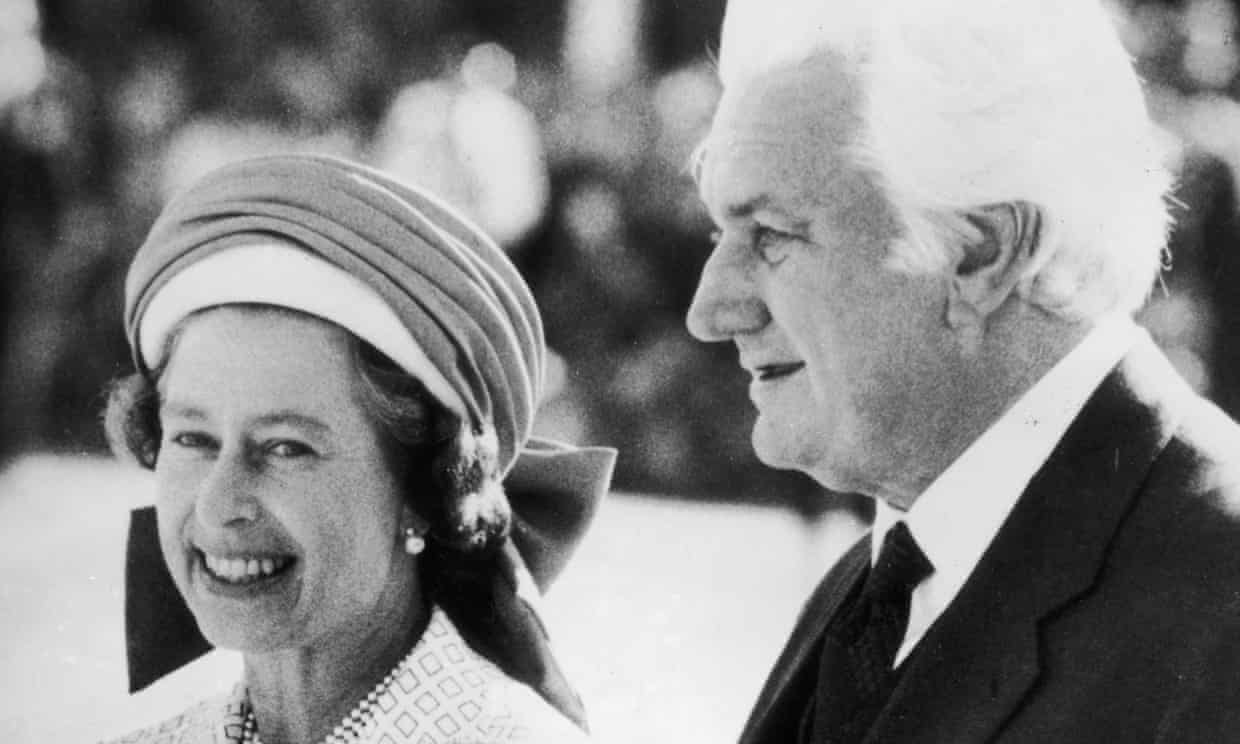
The transparency project
Palace letters: Australian high court allows release of Queen's secret correspondence before Whitlam dismissal
Historian Jenny Hocking wins landmark case after campaigning for release of secret letters between monarch and then Australian governor general Sir John Kerr
by Christopher Knaus, Naaman ZhouThe historian Jenny Hocking has won a landmark high court case in her bid to secure sensitive correspondence between the Queen and former Australian governor general Sir John Kerr about the dismissal of Gough Whitlam.
The high court on Friday ruled that the commonwealth was wrong to withhold the so-called “palace letters”, a series of more than 200 exchanges between the Queen, her private secretary and Kerr, the then-governor general, in the lead-up to the 1975 dismissal of Whitlam, the then-Australian prime minister.
Hocking is now calling on the National Archives of Australia to immediately release the 211 letters, saying the public deserves to know the full history of the greatest political and constitutional crisis in Australia’s history.
“It’s terrific news,” Hocking told the Guardian. “It’s such important news for history, for our nation, because these really are critical documents in our history.
“To have them closed to us, not even through our own laws or regulations, but because of an embargo by the Queen, that has just been a really terrible situation.”
Hocking has spent four years attempting to secure the release of the letters through the courts, a bid resisted by the archives.
The historian has previously found evidence that the palace knew of Kerr’s intention to dismiss Whitlam and was involved in deliberations. She believes the palace letters could reveal what the Queen said and whether she influenced Kerr’s actions.
But the letters are embargoed from public release by the Queen until at least 2027 and potentially indefinitely.
The archives has argued they are “personal” communications between the Queen and the governor general, so ought not be released, because personal communications are not subject to the usual law opening up official commonwealth records to public release after 30 years.
The federal court has previously ruled in favour of that interpretation.
But on Friday the high court ruled the letters are commonwealth records and property of the commonwealth, and ordered the archive’s director general to reconsider Hocking’s request.
In a statement on its decision, the high court said: “Five justices in the majority held that in the statutory context of the Archives Act the term ‘property’ connoted the existence of a relationship in which the commonwealth or a commonwealth institution had a legally endorsed concentration of power to control the custody of a record.
“Their Honours held that the arrangement by which the correspondence was kept by [David Smith, the official secretary to the governor general] and then deposited with the Archives demonstrated that lawful power to control the custody of the correspondence lay with the Official Secretary, an office within the official establishment of the governor general, such that the correspondence was the property of the official establishment.”
The archives released a statement later on Friday saying it was reconsidering Hocking’s request in light of the judgment.
Director-general David Fricker said his organisation was “pro-disclosure”.
“We operate on the basis that a Commonwealth record should be made publicly available, unless there is a specific and compelling need to withhold it,” he said. “We work extremely hard to do this for the Australian people.’
Costs will be paid to Hocking for both this appeal and the case in the federal court.
The court found that the letters were “commonwealth records” under the Archives Act 1983. That does not necessarily mean they will be released, but it does pave the way for them to become public.
Hocking says the NAA has had more than 10 years since she began attempting to access the records to prepare for this moment.
“I expect them to be ready and waiting for me by next week,” she told the Guardian.
The shadow attorney general, Mark Dreyfus, and the shadow assistant minister for the republic, Matt Thistlethwaite, called on the archives to release the documents immediately.
“The Australian people have a right to know the full history of the greatest political and constitutional crisis in Australia’s history,” they said in a statement.
“All 211 of the so-called ‘Palace Letters’ between the Queen, her private secretary and the then governor general should be made accessible to the Australian people immediately.”
The notion that the letters are personal and private, rather than correspondence belonging to the commonwealth, has outraged Hocking and others, who say it simply fails the “pub test”.
The letters represent communications between the two highest members of Australia’s constitutional monarchy in the lead-up to the sacking of a democratically elected prime minister, one of the most important episodes in the nation’s history.
When the federal court previously found against Hocking, justice John Griffiths said the letters were clearly in the public interest. But he said: “The legal issues … do not turn on whether there is a public interest in the records being published.”
An appeal to the federal court’s full bench was subsequently rejected, though one judge dissented.
The dissenting judge, justice Geoffrey Flick, said it was “difficult to conceive of documents which are more clearly ‘commonwealth records’ and documents which are not ‘personal’ property”.
Hocking subsequently turned to the high court, represented by Bret Walker SC with Tom Brennan. The high court agreed to hear the case last year.